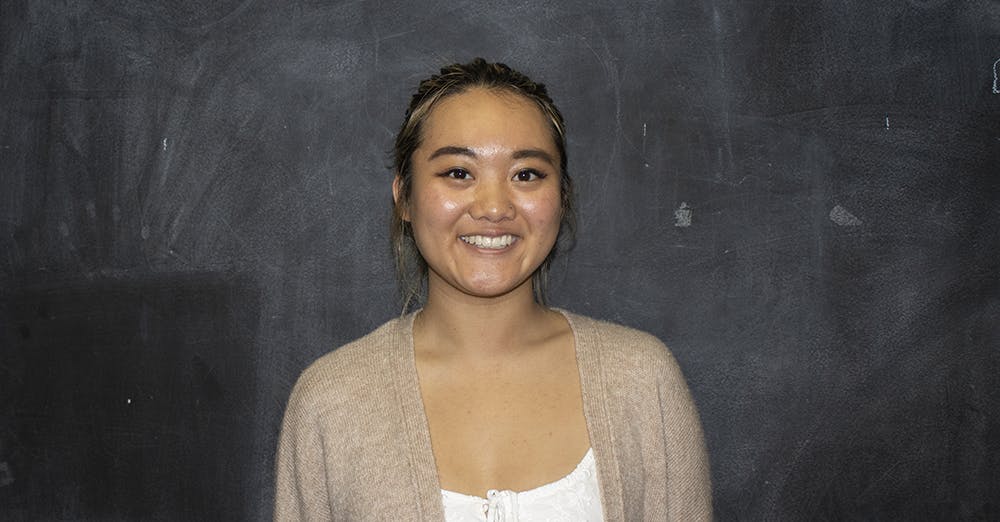Combatting a different kind of outbreak

It’s hard to think of a time when Shanghai, the city I called home for seven years, was completely still. But now, my parents tell me the streets are silent.
What used to be filled by bustling businesses, food vendors and streets littered with a chaotic conglomeration of pedestrians, mopeds and cars is now replaced with fear. This fear manifests itself into quarantined communities and regular government temperature checks and rationed face masks.
While I am free to go out every day and attend classes and visit my friends, my grandma has not left the house in weeks. While we complain about our “broke college life,” food stands near my parent’s apartment cannot make any income at all. While I can buy a 20-pack of respiratory masks at the click of a button on Amazon, my family gets rationed five disposable masks. While our biggest worry might be the next midterm exam, my uncle’s is that his cold might become deadly.
However, what has become clear is that there’s more to fear than just the disease we know as the coronavirus. What may be equally, if not more dangerous, to us sheltered within the borders of the United States is the breakout of xenophobic backlash towards those of Chinese nationality or background, which has spread much farther and faster than the coronavirus ever could.
Comments on social media say that Chinese people somehow deserved this. Others call our culture “disgusting” for eating wild animals, or demand an end to our problematic government. Institutions like a conservatory in Rome banned East Asian students from classes. A paper in France issued a “Yellow Alert.” Companies like the Peking Acrobats have been forced to produce statements disassociating themselves from China and Wuhan. Other Asian American owned businesses in Houston’s Chinatown have lost as much as 70% of their customers. Somehow, our identity of “Chinese” has made us a threat.
Now, it’s clear that even Rice isn’t immune to xenophobia. Earlier, my friend told me one of the professors had asked an international Chinese student not to come to a lab group meeting, for fear that he may infect others. In response, the student emailed the whole research group, apologizing and stating he had removed all the equipment from the lab he had touched, and proceeded to isolate himself. This was well over a month after classes had resumed and he had returned to the United States.
The virus has caused underlying xenophobia to rear its ugly head. Where we should have seen global support, we saw the splintering of communities and people.
To put things in perspective, these kinds of viruses are nothing new. The numbers for the coronavirus have reached 75,000 cases and 2,000 deaths. But during the flu season in the United States this year alone, there have been 21,000,000 cases of influenza, resulting in 20,000 deaths.
The swine flu, which spread to 74 countries and at one point reached phase 6 level of the WHO’s pandemic alert was first isolated from a pig in Iowa. But we did not discriminate against Iowans. We did not blame people for eating pigs, and call them animals. We did not because those ideas seem entirely unfathomable in the face of those who are suffering. It’s time we ask ourselves why we place the blame in this particular scenario against the Chinese government, Chinese people and Chinese culture.
Aside from explicit xenophobic remarks, it is too common to view the coronavirus as a joke among students at Rice. Whenever I cough, I find myself anticipating the inevitable comment, “I hope you don’t have the coronavirus!” These people are usually not ill-intentioned, I understand. But from everyone related to or part of the 1.4 billion people in China, forgive us if we do not find these comments funny.
Earlier this year, we did not joke about the Australian wildfires or about Notre Dame burning down. Instead, we posted and shared pictures of koala bears and kangaroos losing their homes. We sparked a whole social media movement to provide aid to the Australian animal shelters. Just 10 days after the Notre Dame Fire, we collectively raised 835 million dollars.
If we can extend so much care and compassion towards koala bears and pieces of architecture, can we not to other people?
Maybe the fear of the virus infecting our country or state or university is a real one, but the more imminent danger is how we have utilized our paranoia to alienate the people who are in most need of our support.
At Rice, we may not necessarily have the capacity to fly out to China and deliver respiratory masks, but we are not powerless. We can donate to provide relief funds or virus protection equipment to infected areas. We can check on people who have loved ones in China. We can call out insensitivity and xenophobia, even here at Rice. Even 7,500 miles away, every one of us can make a difference.
More from The Rice Thresher
This moment may be unprecedented — Rice falling short is not
In many ways, the current landscape of American higher education is unprecedented. Sweeping cuts to federal research funding, overt government efforts to control academic departments and censor campus protests and arbitrary arrests and visa revocations have rightly been criticized as ushering in the latest iteration of fascism.
This moment may be unprecedented — Rice falling short is not
In many ways, the current landscape of American higher education is unprecedented. Sweeping cuts to federal research funding, overt government efforts to control academic departments and censor campus protests and arbitrary arrests and visa revocations have rightly been criticized as ushering in the latest iteration of fascism.
Obituary for D’Brickashaw Eagleclaw Ibarra
D’Brickashaw Eagleclaw Ibarra, nicknamed DEI, has transitioned to the ancestral plane.


Please note All comments are eligible for publication by The Rice Thresher.